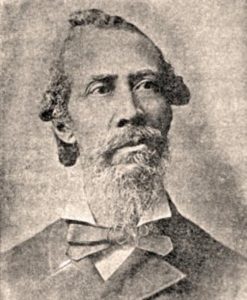
William Howard Day
*On this date, in 1825, William Day was born. He was a Black abolitionist, editor, educator, and minister.
From New York City, his mother, Eliza, was a founding member of the First AME Zion Church and an abolitionist. His father, John, was a sailmaker who fought in the War of 1812 and Algiers in 1815 and died when his son was four.
William Howard Day made an impression as a child on a white ink manufacturer who was an advocate of the abolitionist and temperance movement. He asked Mrs. Day to give him custody of William. This white family, known as the Willistons of Northampton, Massachusetts, raised him. Day enrolled at Oberlin College. After graduation, he spent the rest of his life campaigning for the rights of Blacks.
He became the secretary of the National Negro Convention in Cleveland in Sept. of 1848. He was a committee member along with Frederick Douglass and others who generated the "Address to the Colored People of America." In 1858, the Black citizens of Canada and the United States elected Day president of the National Board of Commissioners of the Colored People. He traveled to the United Kingdom in 1859, preaching at a large congregational church in Lincolnshire, England, and worked with the Young Men's Christian Association. While in England, he and several colleagues formed the African Aid Society. Day returned to the United States after the American Civil War and worked for the Freedmen's Bureau. He became an inspector of schools in Maryland and Delaware before being ordained a minister of the African Methodist Episcopal Church in 1867.
In 1878 Day was elected school director in Harrisburg, Pennsylvania. He was the first colored school board member and president. He won reelection in 1881, retaining his position on the board until 1884. Though he did not seek reelection in 1884, the public appealed for his return in 1887, and he was easily elected to another three years as Harrisburg School Board president. In 1879, during his tenure, he also helped open Livingstone College with J.C. Price, William H. Goler, and Solomon Porter Hood.
Established in Salisbury, NC, for colored students, this institution remains a historic black college. In The Rising Sun, Dr. William Wells Brown praised Day's professional conduct: "As a speaker, Mr. Day may be regarded as one of the most effective of the present time; has great self-possession and gaiety of imagination; is rich in the selection of his illustrations, well versed in history, literature, science, and philosophy, and can draw on his finely-stored memory at will."
Day died in Harrisburg on December 3, 1900, at 75. William Howard Day Cemetery was established in nearby Steelton in the 1900s as a burial place for all people, including people of color who were denied burial at the nearby Baldwin Cemetery. It remains a popular burial site for local African American families.